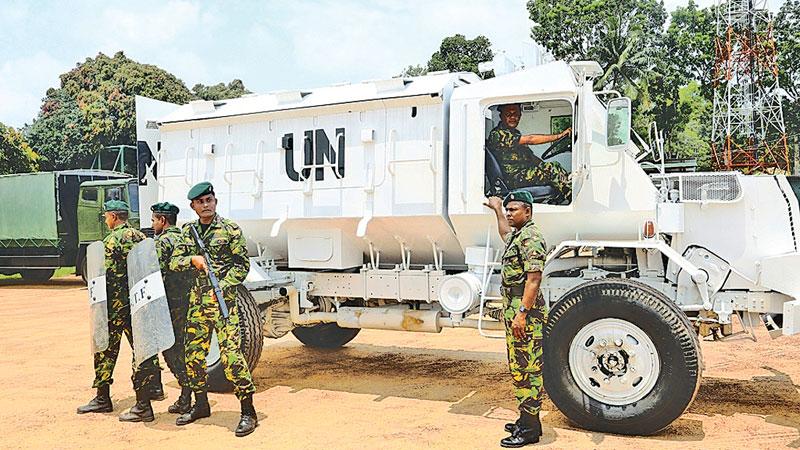
The United Nations has sustained peace keeping missions in some of the most volatile regions of the world, over the past few decades. As nations face internal and external conflicts that destabilize the safety of their citizens the UN has sent trained peacekeeping troops. At present the UN has nearly 90,900 uniformed troops. The first UN peacekeepers were sent to Israel in 1948. In 1988 the UN Peacekeepers were bestowed with the Nobel Prize for their role in maintaining peace.
The Special Task Force of the Sri Lanka Police has achieved a golden milestone in being called upon to train and deploy as an FPU (Formed Police Unit) on their first international mission. In 2014, two officers, SSP Varuna Jayasundera and SP Athula Daulagala were on an assignment in South Sudan.
On their return to the island they were keen to send a contingent of local men on a foreign tour of duty. Subsequently, Chief Inspector R.M.Wimalaratne (at present, ASP- Base Commander, Trincomalee) and Inspector D.G.M.Chinthaka (at present, Instructor VIP Security) were sent for a training program to Jordan in 2015.
ASP Wimalaratne recollected his memories of the two intense months spent in Jordan. There were 60 other officers representing 32 nations. The team of trainers was led by an officer from France with others from Russia, Lithuania, Croatia, Nigeria, Nepal, America and Italy. The Sri Lankan duo had to adjust to the different food and a host of new cultures, as they made many new friends.
The UN training was splendidly delivered with theory and practical skills. Their day began at 7am and ended at 8pm after dinner. The desert terrain with the scorching heat was a challenge. During this time officers were taught many subjects with emphasis given on Public Order Management (the correct term used for controlling aggressive and rioting crowds).
Another important duty done by UN peacekeepers is escorting convoys and manning barricades. At the end of the advanced course CI Wimalarante emerged as the best student, while IP Chinthaka became the best student in arrest and handcuffing techniques. On their return to Sri Lanka these two dynamic officers trained the first batch of 14 officers, who later became trainers.
Contingent
 With foreign officers in Jordan where 2 SL officers had initial UN training. |
On a sunny Tuesday morning, I went to the STF Training School at Katukurunda to meet the FPU contingent of 180 men (troops plus other support staff including electricians, mechanics, cooks and a barber). A section of the contingent dressed in protective body armour was busy practising their Public Order Management drill under Sub- Inspector Greshan Thilekeratne. I was able to watch the teams’ various tactics in using the shield and baton as they moved in formations. IP Chinthaka explained to me how the UN training is done, emphasizing that they do not use rubber bullets to disperse crowds.
Instead, using intelligence feedback on the crowd’s size and temperament the platoon commander will initiate a series of non-contact methods and “clearing waves” to break up the unruly crowds.
When entering hostile crowds in foreign nations the UN peacekeepers move forward in a formation of 6 elements - a contact team (face to face engagement), fire support team (which includes members wielding tear gas guns and automatic rifles, as often gunfire is directed at the team from within the crowds) a commander, a rear safety team, a reserve team (to take custody of arrested persons) and a drive team. Next, 3 men from the team demonstrated arrest and handcuff techniques.
The element of surprise and speed was absolutely outstanding. I began to realize that UN Policing methods have been brilliantly refined, with the highest standards of safety while still upholding human rights.
I was invited to ride inside a Unicorn - a fully armoured troop carrier (painted full white bearing the UN sign) with provision to carry a mounted machine gun. The vehicle can take a crew of 12. Once inside, I was able to peep through a tiny hole in the armour. As the Unicorn sped up, the ride was tough. As I spoke to the driver our voices echoed mildly within the safe domain of the thick armour. As you disembark this awesome vehicle you have to jump down! Peacekeeping is a duty laden with threats and risks.
Duration
The STF team members include single and married men. They will have to be away from their homes and families for the duration of one full year. They have also been mentally and emotionally prepared and taught about venereal diseases. I spoke to the youngest member, Gayan Dhanushka, a native of Hambantota. He said “I am very excited to deploy and proud to represent my motherland”.
All members of the contingent were selected after being tested in English language, physical training and firing. Prior to their deployment they have to face a final inspection by a team of visiting UN monitors who will assess their training and mission readiness and grant them their UN blue berets. Once deployed the FPU team will be almost self sufficient. They will have to send about 18 container loads of mission specific COE equipment including the armoured Unicorns, weapons, ammunition, food rations, medicine, generators, semi rigid tents, stationary, fire fighting equipment and communication sets.
World renowned producer, Chris Ryan who airs the Elite Cops TV show on Discovery Channel, has done a documentary of the STF and makes mention of their discipline and commitment. Commandant of the STF Senior DIG M.Lattif has contributed immensely to this new contingent as he also serves as Director International Affairs of the Police, whereby he has established important affiliations for the Sri Lanka Police.
This UN mission not only enhances the image of our country but also generates foreign revenue. The impending overseas deployment for the Special Task Force FPU contingent will certainly be a rewarding challenge.
